Newsletter 8: Neoliberalism and Its Alternatives
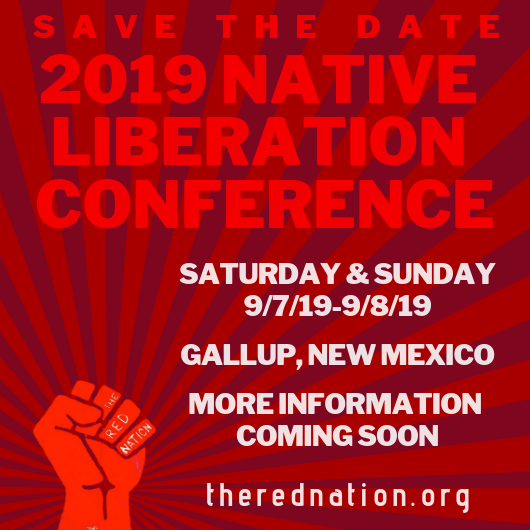
March 5, 2019
Dear friends,
Greetings from The Red Nation.
Neoliberalism is losing its legitimacy across the globe. Part of its demise can be traced to the very thing that gives it life: oil. Climate change—the warming of temperatures caused by the burning of fossil fuels—is intensifying the crisis. The poor face the worst of it; they always do. But they are also struggling to build an alternative. At the forefront of that fight are Black, brown, Indigenous, poor, and colonized people.
In France, the Gilets Jaunes (Yellow Vests) Movement has rocked the country with back-to-back protests since last November. A gas tax levied against the working poor, which the government said would help reduce carbon emissions, sparked the backlash. Why should the poorest pay for the crimes of the industries most responsible for climate change?
Yet a longer, more vicious battle has ensued in Haiti since July of last year. In recent weeks, a fuel shortage caused by corruption and the looting of public assets has inflamed tensions. The economy of the most impoverished country in the hemisphere is hamstrung. Popular protests amplified after February 7 of this year, the day the dictator Jean-Claude Duvalier fled the island in 1986. Cities and roads are nearly devoid of normal life—cars and pedestrians—except for protests. Rallies, motorcycle caravans, strikes, and the burning of police stations and government buildings now define everyday life.
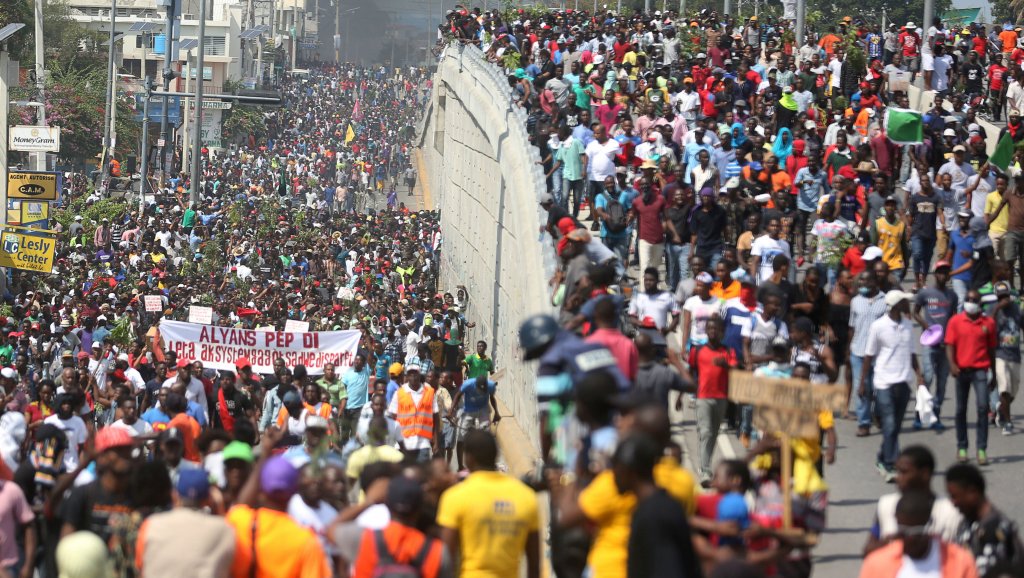
Lautaro Rivara, a sociologist and member of the Dessalines Brigade of Solidarity with Haiti, reports that among the protests one banner clarified the aspirations of everyday Haitians: “We Have the Right to Live Like People.”
The Haitian uprising is directly related to US-backed coup attempt in Venezuela. In 2005, the Bolivarian government under Hugo Chavez integrated Haiti into the Petrocaribe platform, generously donating Haiti billions of dollars for much-needed infrastructure development and subsidizing gas prices—vital resources that the current government under Jovenel Moïse has squandered.
The solidarity economy between the nations stretches back two centuries. In 1815, Simón Bolívar, popularly known as the Liberator of Venezuela, fled to Haiti, receiving protection from the self-emancipated former French slave colony. From Haiti, Bolívar led the successful Venezuelan independence movement from Spain. Moved by the hospitality he received, upon his departure from Haiti Bolívar promised to abolish African slavery as part of the independence movement. He did. The history of solidarity is not forgotten.
Venezuela’s solidarity has also extended to Indigenous nations of Turtle Island, or North America. In 2007, Tim Giago, a preeminent Oglala Lakota journalist, applauded Hugo Chavez and the Bolivarian Revolution for providing heating assistance to hard-hit Indian reservations, the poorest places in North America on the Northern Plains, during the harsh winter months. Citgo Petroleum, a Venezuelan state-owned oil company, has for nearly a decade donated millions of dollars of heating oil not only to reservations communities in the United States, but also to low-income Black and Chicanx neighborhoods and homeless shelters.
Giago excoriated the United States’ hypocrisy for failing to uphold its own treaty obligations while criticizing other countries such as Venezuela, and the failure of capitalist Indigenous economies to keep Indigenous people warm and fed.
“Where was the rich casino-owning tribes?” Giago asked. “Busy counting their money I guess.”
The gravity of enforced reservation poverty hit home this winter, when Donald Trump shutdown the federal government for 35 days to force the construction of his border wall with Mexico. Federal jobs and funding provides (which come in the form of treaty obligations) keep Indigenous families afloat. Without them, families face a choice of food or heat.
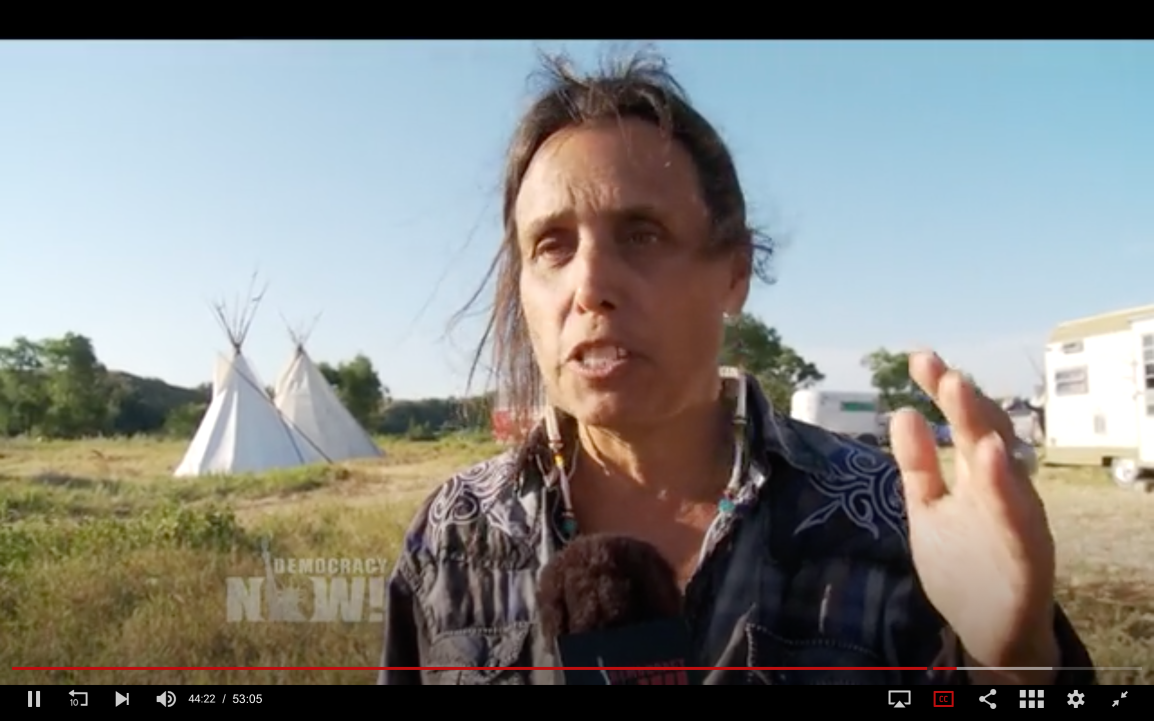
Prominent Ojibwe activist from White Earth Winona LaDuke has also made the connection between the war on Indigenous nations in Turtle Island and the economic war waged against Venezuela. In 2016 during the Dakota Access Pipeline (DAPL) protests, she told Democracy Now! that the construction of DAPL “has to do with crushing Venezuela, because Venezuela has the largest oil reserves in the world.”
As we reported in our last newsletter, the North American oil boom that began in 2007, led by Canada and the United States, made the price of oil drop nearly crippling the Venezuelan economy.
Both the United States and Canada drilled their economies out of the gutter by producing the dirtiest oil in the world from tar sands and fracking rigs at the expense of Indigenous lands and lives. Each proposal for new carbon infrastructure such as oil pipelines not only deepens the climate crisis and locks in carbon consumption, it is also aimed to crush Venezuela.
Why target Venezuela? It partially has to do with its oil reserves. But it also has to do with threat that it poses: an economic and social alternative to neoliberalism.
But what is neoliberalism? Simply put, neoliberalism is a decades-long tax strike of the rich. Instead of redistributing the wealth of the One Percent for social projects that benefit the poorest (like healthcare, education, housing, treaty rights, and environmental protection), public goods are privatized and wealth trickles upwards concentrating into the hands of a few. (We recommend reading the Tricontinental’s excellent pamphlet by Vijay Prashad on neoliberalism, “In the Ruins of the Present.”) That is why proposals like the Green New Deal (though not without its faults) calls for a 70 percent tax increase on the rich to allocate the necessary resources to mitigate climate change and redistribute the wealth. If implemented, the Green New Deal could pose a significant challenge to the neoliberal order. As the planet burns, a ruling class tax strike is the only strike worth breaking.
Neoliberalism, however, has also successfully crushed alternatives to capitalism throughout the globe. For more than half a century, the US has led a bloody counterinsurgency war against any alternative that might force the rich to pay their due, providing fertile ground for the rise of a right wing authoritarianism as the only alternative. We don’t have to look far, whether Trump in the United States or Bolsonaro in Brazil, to see how quickly violent strong men and bigots fill the vacuum left by neoliberalism.
Venezuelans voted the Bolivarian Revolution into power, which, in turn, increased the participation in social, economic, and political life of Indigenous peoples, Women, LGBTQ, Africans, and poor people. The nation’s oil wealth was redistributed to the lowest sectors of society. And while, for a moment, the U.S.-backed coup to oust the democratically-elected president of Venezuela, Nicolás Maduro, seemed imminent, people took to the streets and to the countryside to defend these hard-fought gains. Far from a perfect model (as if there is such a thing), the Bolivarian Revolution represents a possible alternative to neoliberalism.
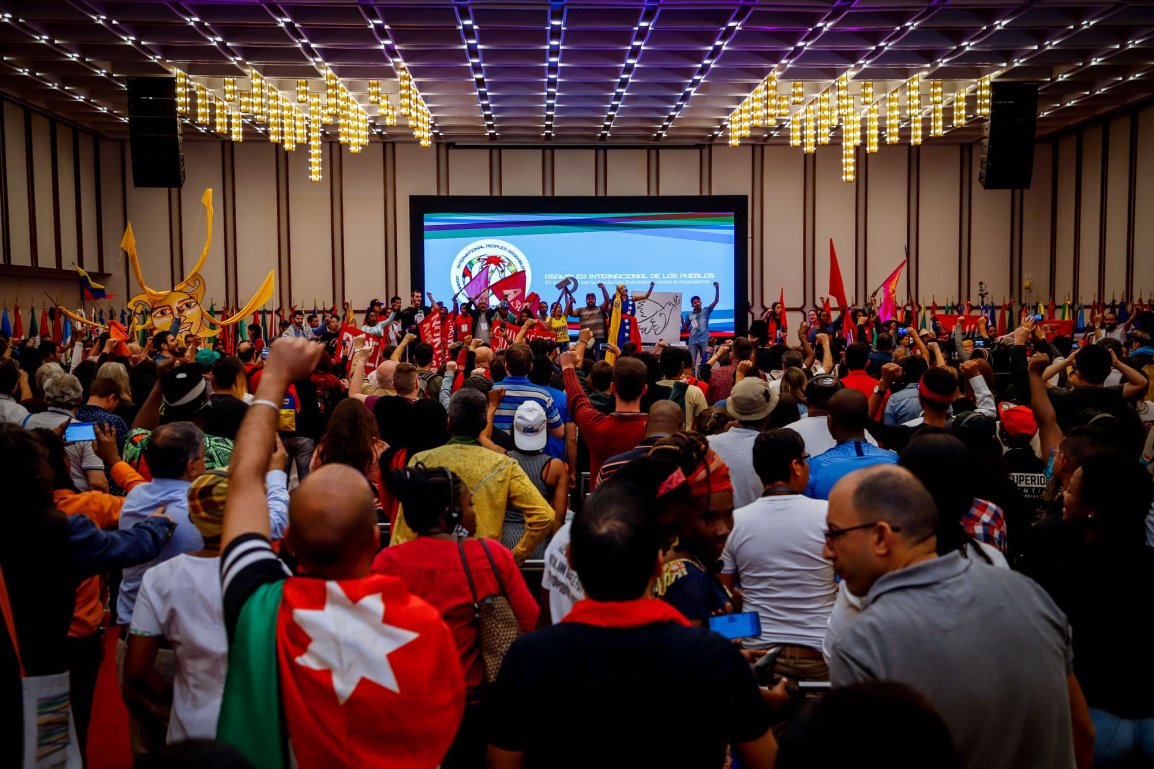
That’s why from February 24 to 27, 500 delegates from 87 countries and 181 people’s movements descended on Venezuela’s capital city of Caracas to participate in the International Peoples’ Assembly in Solidarity with the Bolivarian Revolution and Against Imperialism. In the declaration of solidarity, international assembly stated its aspirations, “The peoples of the world want peace; we do not want another war.”
Maduro closed his address to the people’s assembly with this message:
One cannot be free, one cannot be revolutionary, one cannot be independent without punishment. It is necessary to pay the price of bravery, of rebellion, and of courage. And we are paying that now…They know that here, there is courage, rebellion, that we are confronting North American imperialism and that we are not scared of them. We will continue advancing in the construction of our own model of country.
The looming threat of U.S. intervention remains, but, for now, the Venezuelan people’s movements have won a small but significant victory.
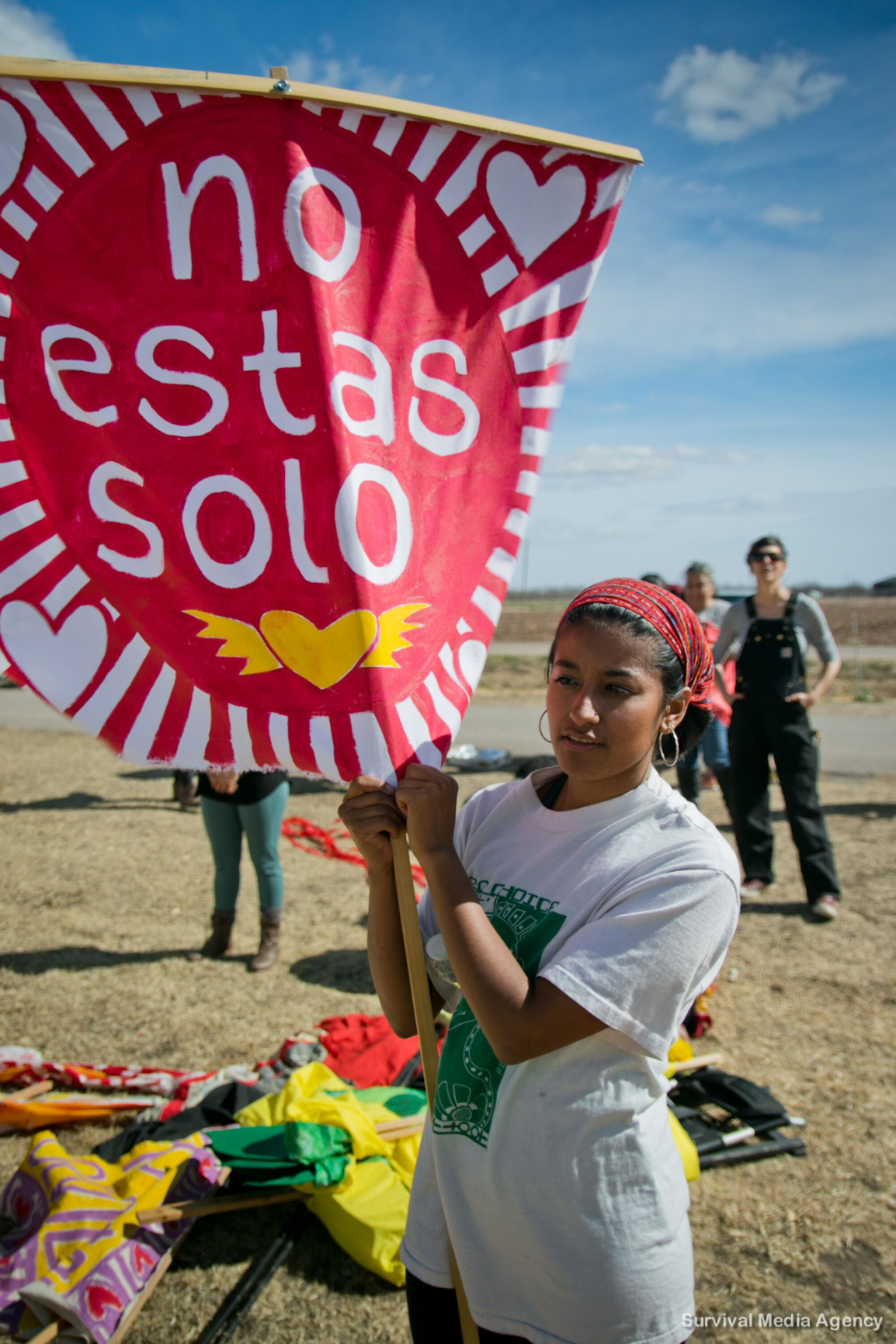
Yet the battle is being fought here in Turtle Island as Trump wages a war against the migrant masses. Our organizers participated in a second solidarity delegation to Tornillo, Texas to protest the continued detention of migrant children at the border. You can read part one of a two-part report by Hope Alvarado here.
Lastly, mark your calendars! We have confirmed dates for the 2019 Native Liberation Conference, which will be hosted in Gallup, New Mexico September 7-8. Like all our events, the conference is free and open to the public. More information coming soon. If you are willing and able to make a donation to help offset costs of hosting the conference (such as rental fees), please do so here. Every dollar helps. We are a one hundred percent volunteer-run organization.

On March 12 in Santa Fe, New Mexico The Red Nation will co-host Palestinian journalist Ahmed Abu Artema, who helped co-found the Great March of Return. RSVP here.

On March 16, the Red Revolution Radio podcast will also be co-hosting with Red Planet a discussion with Red Nation comrade Majerle Lister on my new book, Our History is the Future: Standing Rock Versus the Dakota Access Pipeline, and the Long Tradition of Indigenous Resistance. RSVP here.
The Red Nation is partnering with the national campaign #NoKXL Promise to Protect. If you are interested in participating in a free, public training and workshop on how you can help us stop the dirty Keystone XL pipeline from trespassing through Lakota territory, sign up here.
The world is shaking with anger. There are storm clouds on the horizon. The world we want to live in is actively being built by the humble people, the good people of the earth. But we have to struggle for the world to breath and grow. Join us.
Solidarity forever,
Nick
Upcoming Events:
March 13: Hashtag to Headlines: The Gaza Great March of Return
March 16: Red Revolution Radio Book Panel, March 16
March 23-24: #NoKXL Promise to Protect
September 7-8: Native Liberation Conference (more info coming soon!)
